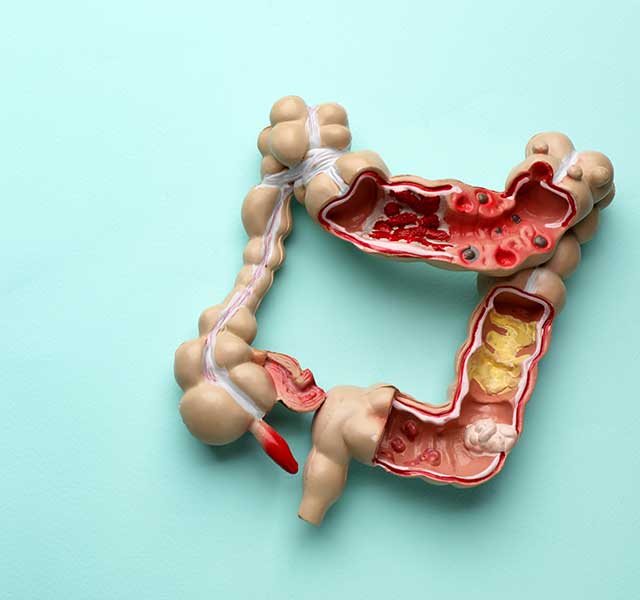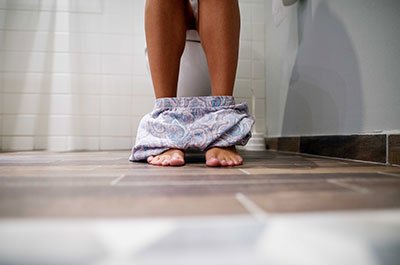Regular colorectal cancer screening is so important to detect colorectal cancer at its earliest stage, when it’s treatable and even curable. But some people shy away from colonoscopy—which is the gold standard for colorectal cancer screening—because of the prep involved. They may also be worried about taking time off work or getting transportation to and from the test, since it requires sedation.
That’s where at-home screening kits come in. There’s little-to-no prep; all you have to do is send stool samples to a lab. At-home kits can also be helpful for those who have alternative medical conditions or limited mobility, which makes it difficult to complete the test prep that’s required for colonoscopy.
“Colonoscopy is still the best option to diagnose colorectal cancer and find precancerous polyps, but at-home tests can be beneficial for those who are at average risk of colorectal cancer,” says Alexandria Glenn, M.D., a colorectal surgeon at Henry Ford Health.
You shouldn’t use a an at-home test if you are at high risk for colorectal cancer, meaning you have:
- A family history of colorectal cancer or precancerous polyps
- A personal history of Crohn's disease or ulcerative colitis
- A personal history of precancerous polyps
- A family history of any inherited colorectal cancer syndrome, such as Lynch syndrome
In the above cases, talk to your doctor about when to start colonoscopy screening and how often to get it done.
Lastly, if you are experiencing gastrointestinal symptoms—if you have blood in your stool, a change in your bowel movements or abdominal pain—you should skip the at-home test and go straight to colonoscopy.
At-Home Screening Options
There are a few options for at-home colon cancer tests. All must be prescribed by a physician. They include:

Colorectal Cancer Screening
- Fecal occult blood test (FOBT). This test looks for small amounts of blood in your stool that could signify colorectal cancer or large pre-cancerous polyps. It won’t pick up smaller polyps that aren’t bleeding. The FOBT test detects blood from anywhere in the digestive tract—even the upper digestive tract—so if the test result is abnormal, it doesn’t necessarily mean you have colorectal cancer. You could have a stomach ulcer instead, for example. The FOBT test requires you to eliminate certain things from your diet—such as liver, some types of red meat and medications like Pepto-Bismol—as they could give you a false positive. Be sure to read the directions. If you receive a normal result, you can continue taking the FOBT test annually for colorectal cancer screening.
- Fecal immunochemical test (FIT). This test also looks for small amounts of blood that could signify colorectal cancer or large pre-cancerous polyps. But unlike the FOBT test, the FIT test only picks up blood from the colon, improving its accuracy. The FIT test does not require you to follow dietary restrictions. If you receive a normal result, you can continue taking the FIT test annually for colorectal cancer screening.
- Cologuard. Cologuard detects microscopic blood in the stool along with DNA changes that occur if you have a cancerous or precancerous polyp—which makes it the most thorough at-home option. It doesn’t require you to follow dietary restrictions. If your results are normal, you can continue taking Cologuard every three years for colorectal cancer screening.
- Colon capsules. A new, up-and-coming option is a pill that you swallow. It contains a small camera that takes video footage of the bowels to detect polyps and cancer. It is currently reserved for people who can’t do colonoscopy or stool tests.
If any of the at-home test results are abnormal, you must undergo colonoscopy for diagnosis. “An abnormal or positive test doesn’t necessarily mean you have cancer,” says Dr. Glenn. “For example, Cologuard will give you an abnormal result if you have a precancerous polyp, which we’ll need to remove with colonoscopy.”
Deciding If An At-Home Test Is Right For You
If you are at average risk for colorectal cancer, you should start colorectal cancer screenings at age 45. If you’re unsure of which screening method to use, talk to your doctor. Together, you can make the best decision based upon your medical history and insurance coverage.
“Research shows that if patients are given a chance to participate in a discussion of their preferred screening method, they’re more likely to be compliant—instead of a doctor just telling them what to do,” says Dr. Glenn. “The whole point is to do something. If you’re nervous about colonoscopy, please consider an at-home test. At the end of the day, it’s so important to complete regular screenings, whether that’s an at-home test or colonoscopy.”
Reviewed by Alexandria Glenn, M.D., a colorectal surgeon who sees patients at Henry Ford Cancer – Detroit, Henry Ford Hospital, Henry Ford Medical Center – Columbus and Henry Ford Medical Center – Fairlane.



